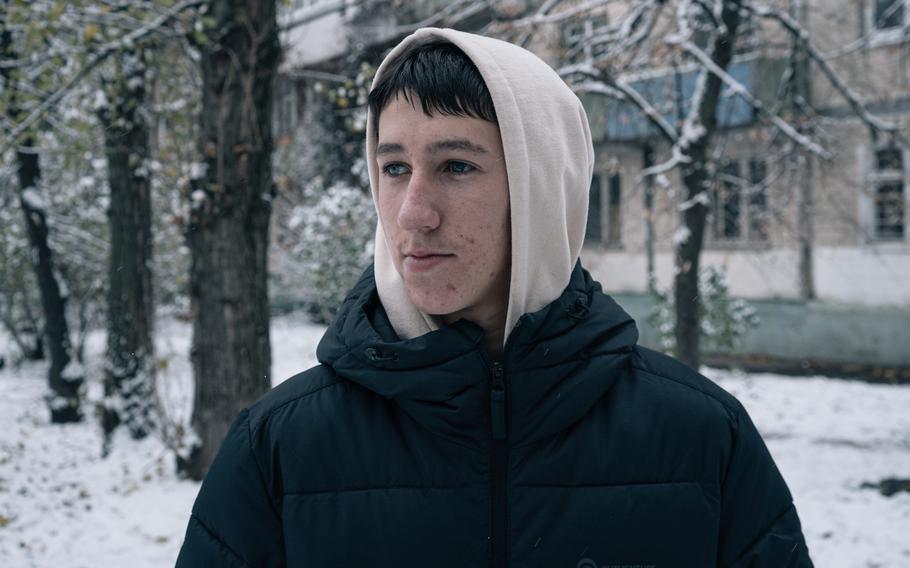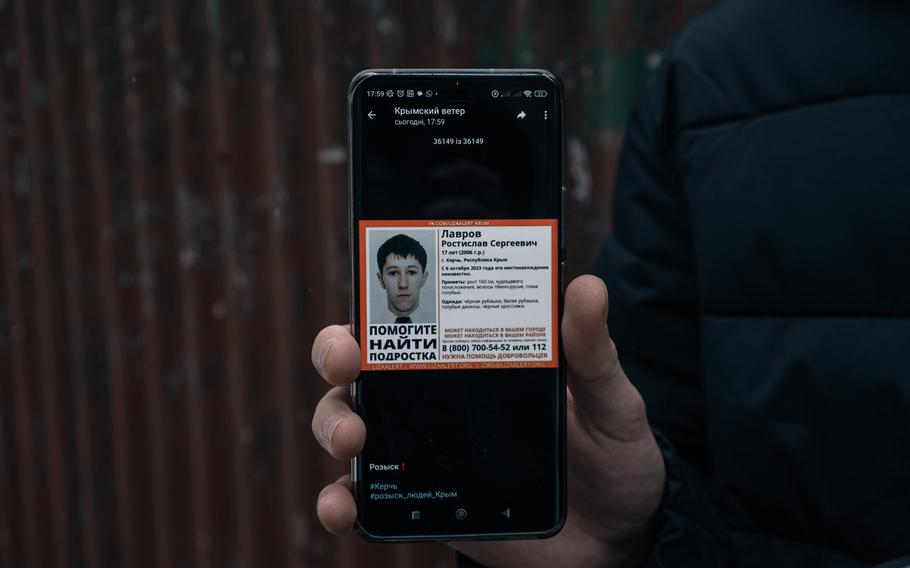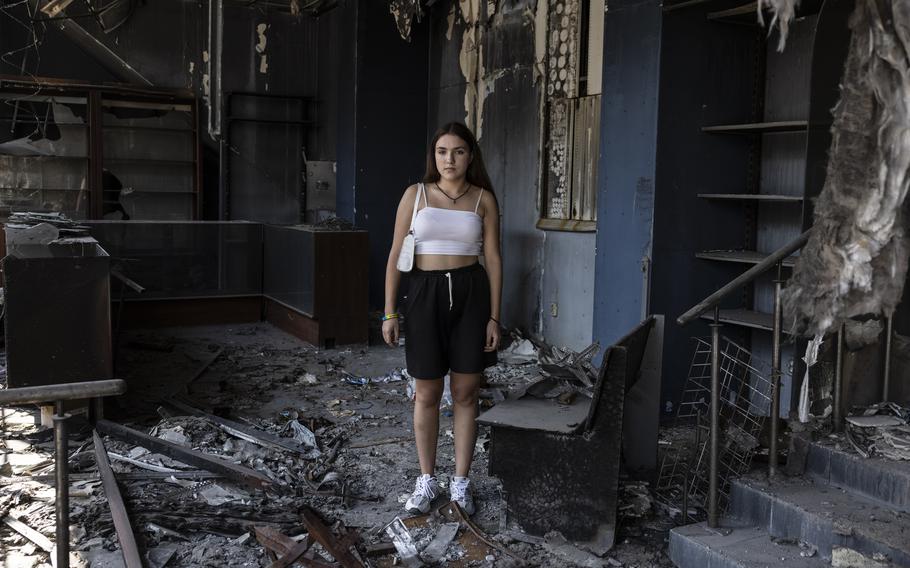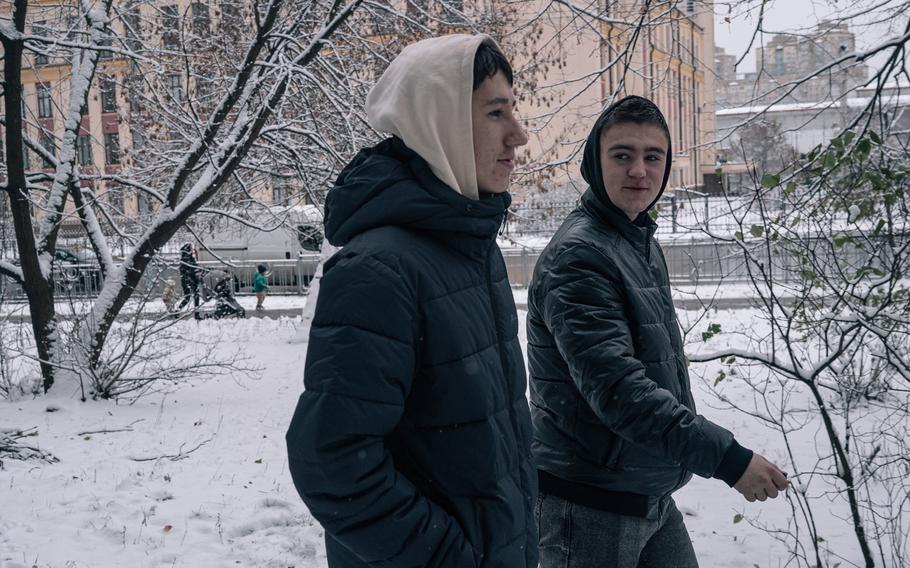Europe
Ukrainian teens held captive by Russia could testify against Putin
The Washington Post November 26, 2023

Rostyslav Lavrov, 17, poses for a portrait on Nov. 22, 2023, in Kyiv, Ukraine. After Russian forces occupied his village in Ukraine, Lavrov was forced to attend camp in Russian-occupied Crimea. In October, he finally returned home. (Alice Martins/The Washington Post)
KYIV — The Russian missing child poster went up in Crimea soon after Rostyslav Lavrov escaped last month. “HELP FIND,” it read. “17 years old, born 2006 . . . Height 160 cm, thin build, dark hair, blue eyes.”
“Anyone who knows anything about the whereabouts of the teenager is asked to report this.”
The attached photo - which Lavrov said was taken several months ago when Russian authorities holding him against his will tried to issue him a Russian ID card - showed the Ukrainian teen sullen in a white shirt and tie.
He is one of three Ukrainian teenagers who fled Russia or Russian-occupied Crimea this summer and shared their experiences with The Washington Post in lengthy interviews in Kyiv and Kherson. They each described systematic efforts by Russian officials to keep them in Russian-controlled territory.
Ukraine says there are thousands of Ukrainian children like Lavrov who were forced to move to Russia or Russian-occupied territory, including Crimea, since Russia’s February 2022 invasion. What makes Lavrov exceptional is that he got out, carrying with him memories of his experience that could one day be used in court to prove Russia committed war crimes by relocating children.
On March 17, the International Criminal Court issued arrest warrants for Russian President Vladimir Putin and his commissioner for children’s rights, Maria Lvova-Belova, which accused them of war crimes for unlawfully deporting and transferring Ukrainian children. Lvova-Belova herself adopted a Ukrainian teen from the occupied city of Mariupol. The Kremlin has denounced the warrants and said they have no legal validity in Russia.
Some of the Ukrainian children in Russia are too young to know their own names or citizenship. Others may be too scared to speak up. Some have already been adopted into Russian families - including by Russian government officials - or issued Russian identity documents.
But accounts from teenagers, who are capable of describing their forced removal and detention by Russian authorities, contradict the Russian narrative that Ukrainian children are finding safety and happiness in Russia. They also pose an immense legal and political threat to Putin, Lvova-Belova and other Russian officials.
Ukraine intends to use their testimony as evidence that Russia is systematically removing Ukrainian children from their homes and culture, erasing their identities to reshape them as loyal Russian citizens.
Escaping Russia
Lavrov saw the missing poster online from 1,000 miles away in Kyiv, where his phone kept ringing. First the calls were from the director of the school where Russian officials forced him to study in Crimea, then from the Russian police.
“Where are you?” they wanted to know. “I’m in Ukraine,” he replied. His name was not registered crossing any border, they told him. People he knew were going to get in trouble for this, the director warned, and a teacher who accidentally marked him present in class the day he left could even go to prison.
Lavrov - who is originally from a village in Ukraine’s Kherson region that was occupied by Russian forces last year - apologized but refused to answer their questions. He didn’t tell them how he fled his dorm room or share details about his travels by car and train through Russia and Belarus before he crossed into Ukraine on foot, clutching his birth certificate as proof of his Ukrainian citizenship.
Instead, the boy sent a Russian police officer contemptuous evidence he was finally in his home country: a time-stamped selfie from Maidan - the central square in Kyiv where Ukrainians famously gathered in protest a decade ago. It is a symbol of Ukraine’s desire to break free from Russian influence and join the European Union.
The Washington Post is not disclosing the full account of Lavrov’s narrow escape from Russia due to ongoing security concerns.
Facing immense pressure over the issue of missing children - the arrest warrant has prevented Putin from traveling to meetings with other world leaders - Russia recently has relented in several cases, allowing a few children to return to Ukraine after mediation by Qatar.
Among them was 17-year-old Bohdan Ermokhin, a Ukrainian orphan from Mariupol who was relocated to Russia and then issued a Russian passport, which Russia said he voluntarily accepted. His Ukrainian lawyer said that while living in Russia he then received summonses to register with a Russian military office, a request Russia described as standard for all boys with Russian citizenship who turn 18 in the country.
Russia insists that it is protecting children, adhering to the law, and helping families reunite when possible. In Ermokhin’s case, Lvova-Belova said in a statement that Russian troops found him “neglected” in Mariupol in 2022 and placed him in the care of a Russian family.
His departure took “into account the unambiguous position of Russia on the issue of reunification of children with relatives separated during the period of the special military operation,” she said.
Ukrainian Ombudsman Dmytro Lubinets - whose office is responsible for negotiating children’s returns to Ukraine - said Ukraine did not recognize Ermokhin’s Russian passport as legitimate and that accepting Russian identification was often “a mechanism of survival” for people living in temporarily occupied territory or moved to Russia. The Washington Post could not reach Ermokhin directly for comment on his case.
After intense diplomatic negotiations, Ermokhin returned to Ukraine via Belarus on his 18th birthday last week, escaping the prospect of one day being conscripted to fight against his own country. That same fate was among Lavrov’s fears while stuck in Crimea with his own 18th birthday quickly approaching.
Securing Ermokhin’s release “was one of the hardest cases” of the war so far, Lubinets said, adding that Ermokhin’s willingness to tell Russian officials he wanted to go home despite the risks made him “a hero.” The ombudsman said he hopes publicity around Ermokhin’s case could encourage other Ukrainian children in Russia to also speak up and find their way back to Ukraine.
Each child Lubinets’s office has gotten out of Russia required its own “operation,” he said. Hundreds of other children have found their way home through other, more discreet efforts, including missions supported by Save Ukraine, a Kyiv-based organization, which has helped parents and guardians travel to Russia to retrieve their children.
One such Save Ukraine mission helped Lavrov’s close friend, Denys Berezhnyi, who is from Kherson city, get out of Crimea several months ago.

Rostyslav Lavrov shows the Russian missing-person poster featuring him on his phone on Nov. 22, 2023, in Kyiv, Ukraine. (Alice Martins/The Washington Post)
Forced away from home
Berezhnyi was studying to become a locksmith when Russia occupied his hometown last year. Then, in October 2022, his school director, who supported Russia’s occupying authorities, told him and other students that they would be required to attend “camp” in Crimea. Berezhnyi, who was then 17, tried to refuse but school officials said they had legal documents certifying his parents’ permission for him to travel. His parents told him they never signed any document and were unaware of the plan, he said.
Fearing repercussions, Berezhnyi agreed to go - traveling by boat and bus with other children from Russian-occupied Kherson into Crimea. Some 600 other kids, including some as young as seven years old, were also enrolled at the camp and Lavrov was among them, the two teenagers said.
Months earlier, Lavrov’s grandmother had died and his mother was hospitalized for severe mental illness. He never knew his dad. At 16, he was living alone in his family house, surviving off his vegetable garden, when a local collaborator working with Russia and three armed Russian soldiers came to his door and told him he needed to move to Kherson city to enroll in school, he said.
Soon after, the school where they sent him forced him to the Crimean camp.
The boys were among masses of Ukrainian children moved out of the Kherson region in autumn 2022 as Ukrainian troops were poised to retake it from Russian control.
So was Diana, who is now 16, and is being identified only by her first name because of security concerns. She was in eighth grade and living with her grandparents when Russian troops seized Kherson.
For seven months, she found her own ways to rebel against Russian occupation. When schools reopened and she had to take Russian history class, she drowned out the teacher’s lessons with music, hiding her headphones with her hair. When Russian soldiers bothered her on the street, she occasionally talked back. So when her school director pressured her and her two best friends, Sonya and Masha, to attend camp in Russia for 10 days last October, she initially refused.
The demands became more persistent. The school director insisted it was for their own safety and pressured the three girls to sign permission slips meant for their guardians, Diana said. The falsified documents allowed them to travel to the camp near the Russian city of Krasnodar. After they signed, Diana recalled, “He was like, ‘Good enough! Give it here!’”
On Oct. 14, 2022, the three girls boarded a train with hundreds of other children, roughly 6 to 18 years old, thinking they would be gone for 10 days, Diana said. Others on board said they heard it would be three weeks.
“We’re sitting on the train, and . . . Sonya goes ‘I think something is wrong,’” Diana later recalled. She tried to reassure her. But weeks passed and the girls were still stranded at the camp, glued to their phones to follow reports that Ukrainian troops were advancing on their hometown.
Similar scenes unfolded at the camp where Berezhnyi and Lavrov were stuck in Crimea. Lavrov spent around nine days total in solitary confinement as punishment, including for not singing the Russian national anthem, he said. Berezhnyi, who is diabetic, said he ran out of insulin and was hospitalized for weeks against his will.
The kids were all scared of what might happen to their families in the fight for Kherson. When one girl learned her village had been shelled, “she was shaking completely and the entire camp was calming her down,” Diana recalled.
Diana, typically outspoken, asked the Russian staff what would happen if Ukraine liberated Kherson city. “’My brother is sitting in the trenches. It’s 100 percent sure that [Ukrainian forces] will not enter the city,’” she recalled one Russian camp official telling her. The official also admonished her not to use the word “liberate.”
Days later, Ukraine made a surprise advance on the city, and Russian troops retreated across the Dnieper River. In Krasnodar, the girls scrolled through footage of people cheering in the streets, draped in Ukrainian flags and realized they - and hundreds of other kids - were now stuck.
Diana said she went back to the same camp official. “Listen, moron,” she recalled telling him. “You promised us that we will be home. . . . How are we going to return?”
But there was no plan. Ukrainian children could not safely cross battle lines back to Ukrainian controlled territory on their own and were also banned from crossing borders from Russia into Belarus or Europe without an accompanying guardian.

Diana, who turned 16 in October, was sent to a camp in southern Russia and was prohibited by Russian authorities from returning home to Ukraine's Kherson region after Ukrainian forces liberated the city last year. (Alice Martins/The Washington Post)
No easy way out As autumn 2022 gave way to winter, some children from areas of Ukraine still occupied by Russia were sent home. But children from liberated areas of Kherson and the northeast Kharkiv region were moved to a smaller campsite in Russia.
Eventually, kids from Kharkiv were sent to the Russian city of Yeysk, Diana said, while those from Kherson were put in a hotel in the city of Anapa. Diana watched some Ukrainian mothers risk their own safety to come collect their stranded kids.
The Russian adults in charge of kids at the hotel in Anapa told those who remained that anyone not picked up by New Year’s would be put in the custody of the Russian police and sent to boarding school, Diana recalled.
She knew no one would come for her.
The teenager has no relationship with her mother and was raised by her grandparents, who could not afford to travel. Her father, who has another family, was not allowed to exit Ukraine due to martial law banning military-aged men from leaving.
Sonya’s mother came to get her. Masha’s grandmother came for her next. “I was left alone and then it was really hard,” Diana said.
Desperate, Diana contacted her godmother, who was living in Russia. On Jan. 9, she picked her up from the hotel.
For the next six months, Diana stayed with her in the city of Vityazevo. It was a dark time, she said, in which she would stare at her house keys from Kherson and search online for ways to return home.
In Crimea, Berezhnyi and Lavrov were searching for their own ways out.
By early this year, they were still stuck at camp when Russian officials sent them to the Crimean city of Kerch and enrolled them to study at a technological institute, the teens said. Russian authorities moved Lavrov’s mother to a hospital in Crimea and told him they issued her a Russian passport. They said he should accept one too. He refused.
Then, in early summer, a fellow Ukrainian student’s mother came to escort him out. With help from Save Ukraine, Berezhnyi’s parents signed power of attorney documents to let her take him. But documents the organization provided for Lavrov were refused due to complications over his mother’s guardianship, despite her hospitalization. His classmate’s mother took the issue to a Russian-controlled court in Crimea and was rejected.
They had to leave without him.
Diana, meanwhile, knew her friend Sonya had gotten home in part with the help of volunteers from Save Ukraine. She contacted the organization and they said they might be able to help her too. Another mother from the Kherson region was planning to go to Russia to retrieve her kids, they told her, and with a power of attorney document signed by Diana’s father, she could travel with them.
Her dad agreed and on July 27 - eight months after she first entered Russia - she boarded a bus with the woman and her two children, strangers who held the ticket to her escape. They traveled for a week straight and she reached Kherson on Aug. 4, her grandmother’s birthday. She surprised her at home with a cake.
“There were tears in her eyes,” Diana said in Kherson this summer. “We hadn’t seen each other for almost a year . . . I was scared that she’d have a heart attack.”
Lavrov was still stuck - and the months after his friends got out were a blur of misery.
When the dorms in Kerch closed for the summer, school officials sent him to a camp for troubled children elsewhere in Crimea. He began plotting again how to get out. When he returned to school this fall, officials again tried to push Russian documents on him, he said, including a Russian version of his birth certificate, which he burned. He fled soon after.

Rostyslav Lavrov and Denys Berezhnyi walk in Kyiv, Ukraine, on Nov. 22, 2023. (Alice Martins/The Washington Post)
When he finally reached the border last month and saw the blue-and-yellow Ukrainian flag, he practically ran toward it, he said. Save Ukraine volunteers he told about his successful escape were waiting for him on the other side.
They drove him to a shelter in Kyiv. When Lavrov stepped out of the car, Berezhnyi was there, waiting for him. They would be roommates and the teens, who had survived Russian captivity, were together again.
This time, in the capital of Ukraine.